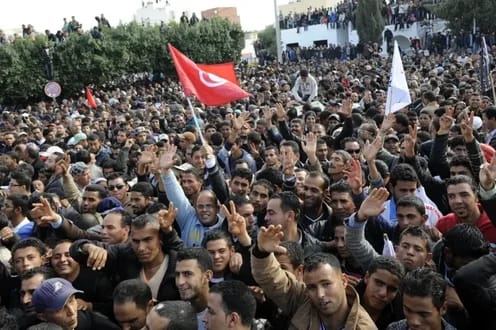Published on: January 18, 2020
مقالات ذات صلة:
Has the Arab Spring Truly Ended?
Through force and repression, an emerging democratic spring in the region was deliberately buried before it could fully bloom. Counter-revolutions worked to suffocate this Arab Spring in its infancy, extinguishing the glimmer of hope that had finally begun to shine after years of darkness and despair. Ironically, the Arab Spring was a manifestation of the famous phrase: “If the people one day will to live, destiny must surely respond.” Yet, just as quickly as hope emerged, it was crushed—Syria was only the beginning, and Yemen was far from the end.
What many did not realize, however, was that dividing the cause into multiple banners and splintering unity into factions would inevitably lead to disaster. Scattered and isolated, the movements of the Arab Spring quickly fell prey to the counter-revolutions. But after eight years, the Arab Spring resurfaced where it first began—in the Maghreb region—this time in Algeria, the land of a million and a half martyrs. The people of Algeria, standing firm in their dignity and resilience, forced Abdelaziz Bouteflika to join the ranks of deposed tyrants and military rulers. The revolutionary wave continued in Sudan, where Omar al-Bashir was toppled. As the Arab Spring approached its ninth anniversary, Tunisia saw an attempted coup against its democratic revolution, while in Libya, anti-Haftar forces—fighting against the counter-revolution’s representative—secured significant victories.
Is the Arab Spring Reviving, or Is This Its Final Struggle?
This raises an urgent question: Has the Arab Spring returned, or are these just its last gasps before ultimate defeat? Some argue that the Arab Spring never left to begin with. In political history, waves of popular uprisings fluctuate in intensity, but they always move toward their goals in the long run. The ongoing battle in Libya, for example, is not just a military confrontation but a reflection of popular resistance against tyranny and military rule. The swift and decisive victories over Haftar’s militias, particularly in cities like Sorman and Sabratha, would not have been possible without strong grassroots support.
These movements represent a renewed wave of struggle for liberation from authoritarian rule. They are not just spontaneous uprisings but part of a broader ideological shift. The Arab Spring is not merely about toppling regimes—it is about entrenching a consciousness of rights, freedoms, and the peaceful transition of power. The revolutions are not bound by time or place; they ignite wherever and whenever conditions allow.
Each Nation Has Its Own Context
Skeptics often attempt to discourage revolutionary movements by citing the Syrian, Libyan, and Yemeni experiences as cautionary tales. However, such comparisons ignore crucial contextual differences.
The Syrian case, for instance, was shaped by deep sectarian fault lines, which do not exist in most other Arab countries. These divisions facilitated Iran’s intervention under the pretext of defending Shiite communities, followed by Russia’s military involvement, tipping the balance in favor of the Assad regime. But is the Syrian model replicable elsewhere?
The answer is a firm no. Russia’s intervention in Syria was driven by specific geopolitical and economic interests, and it came at a heavy financial cost. Amid ongoing economic crises and Western sanctions following its annexation of Crimea, Russia is unlikely to embark on another costly military adventure. Moreover, the chaos caused by the Syrian war has severely disrupted the West, triggering mass refugee flows and creating fertile ground for extremist groups like ISIS. Western powers are keen to avoid another Syria-like scenario, particularly given the global economic strains and the high costs associated with counterterrorism efforts. Instead, they now see a more pragmatic approach in countries like Egypt and Tunisia—ensuring their interests are protected without the heavy price of war.
Have Counter-Revolutionary Tactics Failed?
While no one can predict the future with certainty, past experiences provide valuable insights into how authoritarian regimes operate. History shows that when oppressive systems are dismantled, little remains to obstruct progress toward development and prosperity. However, despite each nation’s unique circumstances, two recurring tactics have consistently been used to suppress revolutionary movements:
1. The “War on Terror” Narrative: The branding of opposition groups—particularly Islamist factions—as existential threats, creating a pretext for repression.
2. The Myth of Military-People Unity: The claim that the military serves as a guardian of the nation, justifying its interference in political affairs.
External interventions also play a critical role in suppressing revolutions. Countries known for opposing the Arab Spring—such as the UAE and Egypt under Sisi—have actively supported counter-revolutionary forces. However, such interventions can only succeed when internal forces are complicit. Haftar, for instance, is merely a tool of Libya’s former regime, just as past military figures in Algeria and Egypt were used to maintain the status quo.
A striking example is Algeria’s post-independence history. In 1965, Defense Minister Houari Boumediene staged a coup against Algeria’s first civilian president, Ahmed Ben Bella, a revolutionary hero who fought French colonial rule. Despite the economic progress under Boumediene’s rule—often referred to as Algeria’s “golden era”—his military background solidified the army’s role as the ultimate arbiter of political power. After Boumediene’s death, the military installed Chadli Bendjedid, whose corruption and economic failures eventually triggered mass protests.
The Islamic Salvation Front (FIS) then emerged as a powerful opposition force, winning broad public support in a matter of months. However, when FIS dominated the elections, the military staged a coup, plunging the country into a bloody civil war. In an effort to pacify public outrage, the military appointed Mohamed Boudiaf as president. Yet, when Boudiaf attempted to purge military leaders from power, he was assassinated—conveniently blamed on Islamists.
A similar scenario unfolded in Egypt. After the 2011 revolution, the army quickly reasserted control, using the fear of Islamist rule as a justification. The “people and army are one hand” slogan was strategically employed to dismantle the revolution’s momentum. This manipulation ultimately led to the military coup of 2013, reversing the gains of Egypt’s democratic transition.
The Arab Spring Is a Long Struggle, Not a Momentary Uprising
The core message is that revolution is not a singular event but a long-term process—an idea, a consciousness, and a relentless pursuit of freedom and justice. Revolutions begin before regimes fall and continue until full rights and liberties are secured. Learning from past mistakes and avoiding historical pitfalls is key to success.
One of the biggest failures of past revolutions is their tendency to repeat the same errors. In Egypt, for example, the country underwent a major revolutionary wave during the 1952 Free Officers’ coup, only to later fall into the same traps during the 2013 counter-revolution. The lack of long-term strategic planning and intellectual preparation has often delayed revolutionary success.
For perspective, the French Revolution took a hundred years to fully achieve its goals, whereas the American Revolution consolidated its objectives in just eighteen years. The path to revolution varies in length, depending on historical, social, and political conditions. However, the fundamental lesson remains the same: for revolutions to succeed, the military must be entirely removed from politics, all remnants of the old regime must be dismantled, and divisive fear tactics must be rejected.
As long as the people remain united, their revolution will continue—no matter how many times oppressors try to suppress it.














